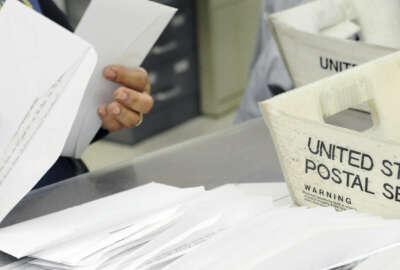

Hubbard Radio Washington DC, LLC. All rights reserved. This website is not intended for users located within the European Economic Area.
The Federal Law Enforcement Officers Association has called for Congress to help out the Postal Service and in particular its law enforcement components.
Best listening experience is on Chrome, Firefox or Safari. Subscribe to Federal Drive’s daily audio interviews on Apple Podcasts or PodcastOne.
You might have noticed, the Postal Service has not received the largesse Congress has been heaping on others throughout the economy. The Federal Law Enforcement Officers Association has called for Congress to help out the Postal Service and in particular its law enforcement components. Joining Federal Drive with Tom Temin with more, the FLEOA president Larry Cosme.
Interview transcript:
Tom Temin: Larry, good to have you on.
Larry Cosme: Thank you Mr. Temin for having me on. I appreciate it.
Tom Temin: So give us a sense, remind us, that the Postal Service has law enforcement components. It’s not just all delivery and sorting people.
Larry Cosme: No, absolutely the Postal Service, first of all, I’d like to thank all the employees with the Postal Service. They are doing an outstanding job doing this global pandemic crisis. Certainly most folks don’t even think about Postal Service. But all those packages that folks are asking to be delivered, those are delivered by postal employees for the most part. But we do have three different components that we do represent within the Federal Law Enforcement Officers Association. We have the Postal Inspectors that fall under the US Postal Inspection Service. We have the Postal Inspector General’s office. And we have, we’re not their primary bargaining agents, but we do represent the postal police officers also. We’ve worked with their unions in the past and collaborated with them with their union in the recruitment of members. We do represent those components. And they do have those three law enforcement components that we do represent within the Federal Law Enforcement Officers Association.
Tom Temin: And I guess like other postal workers throughout the whole Postal Service system, they’re kind of in a limbo, because they’re always saying, well, we’re not a federal agency, we are a private business that operates in competition with all of these other delivery companies. But yet those companies don’t need 10 levels of approval from boards of governors and Congress to raise the price of a stamp two cents.
Larry Cosme: You’re absolutely right, Mr. Temin, you have all these congressional mandates. And the way I equated is to mandates that like, say the Education Departments have for like schools, you have all these mandates for the postal service, and then I look at it as unfunded mandates and I think Congress has an obligation to fund the Postal Service completely and help them because these are mandates that the postal employees, they cannot wiggle their way around. And they have all these mandates and rules and regulations that they have to abide by because they’re set by Congress and these boards, and therefore, it’s not like a private entity that can turn around and say, okay, we can hire X number of employees, we could reallocate X number of employees in the private sector is a little bit different because they don’t have all these mandates on them. They just have, you know, different parameters to operate under. And that’s what’s happening in the Postal Service. And Congress needs to really pay attention to them. They cannot treat them like stepchildren, you know, and this is no offense to stepchildren. But you know, it’s like the old story like, oh, this is like the stepchild. I’m not going to treat them any better. No, they should be treated, stepchildren should be treated, treated equally as if they’re your own children. And I’m talking about these our federal employees. And that’s the way I view them as the leader of the Federal Law Enforcement Officers Association.
Tom Temin: And we know that the carriers are experiencing an explosion in work because of all of the packages being delivered, everybody’s ordering toilet paper and big boxes and this kind of thing. What are you hearing from the law enforcement parts of postal? What’s their tempo like now?
Larry Cosme: Yes, they’re out there. They’re out in the field and they’re out there fielding their calls out their physical presence, making sure that their Postal Service is secure for those folks that are requesting all these packages to be delivered. These individuals that are behind the scenes, I say they’re ensuring that this is being delivered to your home, to your residents to your business over if you’re still operational in this tempo, and you’re still open during this environment right now or when it’s going to reopen. If you think about it right now, the Postal Service is operating at a very high tempo. So think about it when the states throughout the nation start reopening the regular businesses that have been closed. Think about the operational tempo. It’s going to be like quadruple fold, because now these businesses are going to require a certain amount of goods that are gonna have to be delivered. And the Postal Service is going to ramp up in terms of, you know, delivered goods. So the men and women in all those three components identified at the beginning of our conversation here with the Postal Inspection Service with the Postal Inspector General’s Office and the postal police. They are working very hard, they’re out there, they’re making sure that the Postal Service is secure, that their employees are safe, you know, and it’s operating environment that we’re operating today.
Tom Temin: And just to branch out to federal law enforcement generally, many of the FLEOA components throughout the federal government are not people that can telework, and they are often going to work situations which might be infected or difficult that you would have to go to anyway. What’s the situation are they using their paid sick leave that was granted by Congress. Are they going in and muscling it through, despite the situation? What’s going on?
Larry Cosme: No, they’re still out there in the field. They’re on the front lines, just like the medical personnel that are treating the folks that are ill. These employees that we represent throughout the federal law enforcement community, which are 65 different federal law enforcement entities within the US government, and runs the gamut. Some are actually home because they’re quarantine because of exposure. And a great majority of them are out there in the field. And obviously with rotational basis because of, you know, they have to always have a contingent that can respond to national security incidents. But they are out there, they’re you’re wearing your personal protective equipment that we’ve advocated for, we call it they call it PPE in the federal budget than some of those line appropriations, and we have advocated very hard for them to have that personal protective equipment with Capitol Hill and with the Trump administration. We’ve also advocated very hard on their behalf to make sure that they have adequate personal protective equipment when they’re out there performing your duties on behalf of the American public.
Tom Temin: You our former Immigration and Customs Enforcement, and those officers and also Customs and Border Protection are really often in the hotspots in more ways than one. And now with the coronavirus, I think it’s an added element there. What do you hear from those people out on the real frontlines?
Larry Cosme: Oh, absolutely. I retired as a special agent with Homeland Security Investigations, which is a component of ICE. They’re encountering all different facets. You know, they normally had the you know, a lot of these folks were, you know, the PPS when you’re dealing with a land border issues and you’re getting folks that are coming these immigrants that are coming from abroad, and you don’t know what kind of communicable diseases they may have. I’m not saying at all do but you have to protect yourself, you know, in these environments, and now it’s even threefold because of the coronavirus. Things have slowed down a little bit, but I believe they’re going to ramp up again, because of, you know, immigration is a hot button issue in this country. And it I’m glad that the border both at land, air and sea have you know have been tightened up and then should be continued to tighten up and obviously that with the protection of the men and women that we represent at these locations, because it’s tough, it’s not easy. It’s around the clock. It’s not something that you can turn off a light switch and say, well you know what, I’m going home tonight, because I’m done doing my work. No, it’s not a 9 to 5 job. This is a 24/7job. And these men and women are out there, you know, the US border patrol agents, and obviously, they have their union represented by in the ICE agents that are out there, and all the other different components you have. I know on the border, because I worked the border before my retirement recently, on the border, you have like 12 different federal agencies that have been out there supporting a mission to secure our border and secure our nation. So it’s a public health issue that we’re concerned about, but obviously an issue that there’s public health is affecting the general public, but it’s affecting the men Women on the front lines, you know, with all these different agencies that are out there, we have the US Coast Guard personnel that we also represent and sieges, mitigative services with the US Coast personnel, the uniform Coast Guard and folks that are out there, the US border patrol that are represented, obviously by their union. But we also have a component of folks that we represent that area. We have the Air marine folks, we have the ICE agents and officers with the enforcement removal operations. And we represent these folks and they’re on the front lines every day, they don’t go home and say, Okay, I’m not going to go show up to work today. But we do have some of these folks that are obviously in quarantine because of the circumstances of the exposures because it’s day in and day out. And it’s on a case by case basis. So it’s a very dangerous environment that they’re operating in right now because it’s the unknown enemy basically.
Tom Temin: Larry Cosme is president of the Federal Law Enforcement Officers Association. Thanks so much for joining me.
Larry Cosme: Thank you. Mr. Temin. I really appreciate you having me on. Thank you.
Copyright © 2024 Federal News Network. All rights reserved. This website is not intended for users located within the European Economic Area.
Tom Temin is host of the Federal Drive and has been providing insight on federal technology and management issues for more than 30 years.
Follow @tteminWFED


